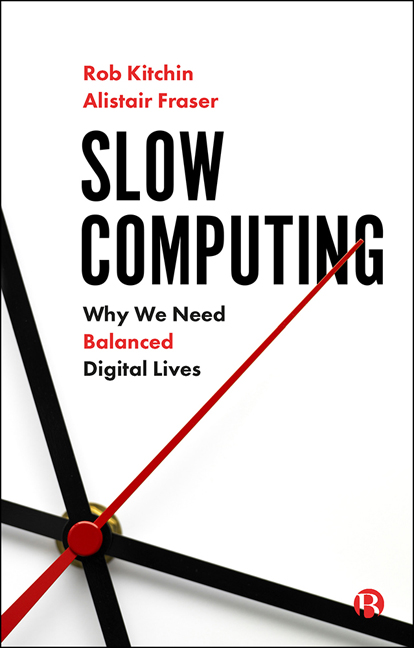Book contents
- Frontmatter
- Dedication
- Contents
- About the authors
- Acknowledgements
- 1 Living Digital Lives
- 2 Accelerating Life
- 3 Monitoring Life
- 4 Personal Strategies of Slow Computing
- 5 Slow Computing Collectively
- 6 An Ethics of Digital Care
- 7 Towards a More Balanced Digital Society
- Coda: Slow Computing During a Pandemic
- Notes
- Index
5 - Slow Computing Collectively
Published online by Cambridge University Press: 12 March 2021
- Frontmatter
- Dedication
- Contents
- About the authors
- Acknowledgements
- 1 Living Digital Lives
- 2 Accelerating Life
- 3 Monitoring Life
- 4 Personal Strategies of Slow Computing
- 5 Slow Computing Collectively
- 6 An Ethics of Digital Care
- 7 Towards a More Balanced Digital Society
- Coda: Slow Computing During a Pandemic
- Notes
- Index
Summary
Friday. 5pm. The strangest thing just happened. An email from management arrived saying: ‘In accordance with the firm's new work-life balance strategy, the email client will be paused today at 5.30pm and will reopen on Monday at 8.30am. All messages sent during the weekend will be held by the client and delivered on Monday morning. All staff are requested to enjoy the weekend. Management are exploring the possibility of also pausing the email system overnight during the working week.’ You don't get it. What's got into them? A colleague stops by. Apparently, the union pushed for this. Management agreed because they thought it’d be good PR. The local news channel's running a story on it tonight. Whatever, it seems like brilliant news and the office is buzzing.
It's hard to believe that any company would make such a move, right? Or that an employer would install an open source operating system on all of its computers and encourage all staff to use a Tor browser. But why not imagine such collective moves toward slow computing? For all that slowing down requires individuals to adjust their practices and create individual choreographies of data dancing to secure data sovereignty, slow computing collectively is ultimately what's needed. Workplaces are as good an arena to begin as any. In fact, given the reality of ‘working time drift’ there are few sites as appropriate to implementing the slowness in slow computing. In this regard, therefore, we tip our hats to the French ‘right to disconnect’ policy, a move akin to what we have mentioned in our imagined example. Workers in French companies with more than 50 employees now have the right to negotiate times when they will not be obliged to check emails or text messages. Companies in other jurisdictions have implemented similar policies aimed at protecting their workers from stress-related illnesses and burnout and ensuring they get suitable rest. For example, Volkswagen blocks work email being sent to the mobile phones of workers between 6pm and 7am, and Daimler permits workers going on holiday to automatically delete all new emails while they are away. Those seem like positive steps in the right direction.
- Type
- Chapter
- Information
- Slow ComputingWhy We Need Balanced Digital Lives, pp. 109 - 133Publisher: Bristol University PressPrint publication year: 2020



